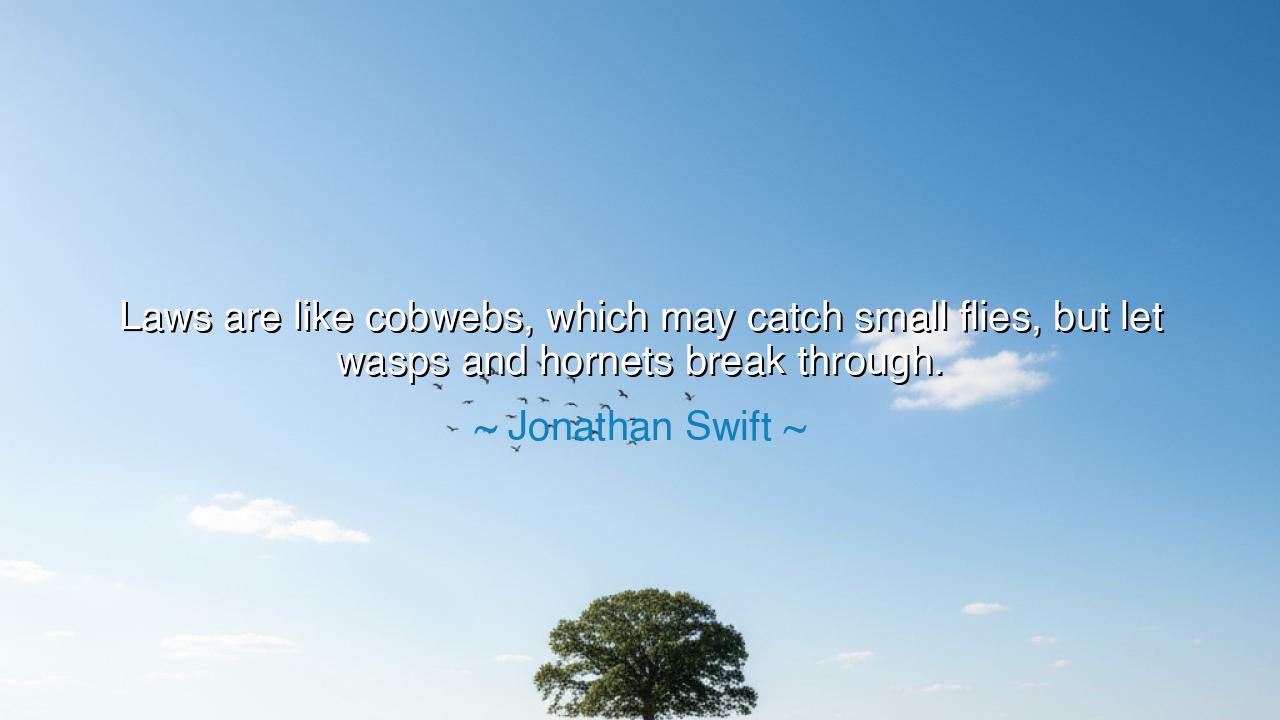
Laws are like cobwebs, which may catch small flies, but let wasps
Laws are like cobwebs, which may catch small flies, but let wasps and hornets break through.






Hear the piercing wit of Jonathan Swift, master satirist and moral teacher, who wrote: “Laws are like cobwebs, which may catch small flies, but let wasps and hornets break through.” At first, this saying stings with cynicism, but beneath its irony lies a profound truth about power, justice, and corruption. Swift, who lived in an age when kings, nobles, and ministers bent the law to their own advantage, saw with clarity that the law too often binds only the weak, while the strong, shielded by wealth and influence, break free from its grasp. His words are not just a jest, but a warning carved into the memory of nations.
The meaning of this saying lies in the fragile image of the cobweb. A cobweb is intricate, delicate, spun with precision—but it is easily torn by anything larger than a fly. So too with the law, which is often detailed and elaborate, yet proves fragile when pressed by the force of wealth or political power. The poor man, the fly, is caught and punished for his transgressions, however small. But the rich man, the wasp or hornet, uses his stinger—his influence, his bribes, his armies of lawyers—to push through the web, leaving it broken behind him. Thus, Swift condemns the hypocrisy of societies where justice is proclaimed as equal, but in practice is bent toward the powerful.
History gives us many sorrowful examples. In Swift’s own time, the common thief who stole a loaf of bread in London might be hanged at Tyburn, while great ministers of state enriched themselves through corruption and mismanagement without consequence. Centuries later, during the financial crisis of 2008, small homeowners lost their savings and their homes for failing to pay debts, while vast banks—whose reckless gambling endangered entire economies—were rescued by governments. The flies were caught and devoured, but the wasps and hornets broke free, their wings unscathed. Swift’s metaphor rings true across ages.
And yet, the ancients knew this truth long before Swift gave it biting form. In Athens, men spoke of Draco’s laws as “written in blood,” for they fell with harshness upon the common folk. In Rome, the historian Tacitus wrote that laws were like spider webs: they held the weak but were torn apart by the strong. These ancient voices, echoed by Swift, reveal that the tension between law and power is not the flaw of one age but the enduring struggle of all civilizations.
But Swift’s words are not meant to inspire despair—they are meant to awaken vigilance. For if the law is a cobweb, then it must be strengthened, made not of fragile silk but of iron threads. A society that tolerates laws which bind only the weak is a society on the brink of collapse, for resentment festers, and injustice grows until it consumes the whole. Justice that favors the powerful is no justice at all—it is only the mask of tyranny.
The lesson for us is clear: demand accountability not only for the small, but for the great. Do not let the mighty escape the law’s grasp while the humble are crushed beneath it. Honor judges and leaders who seek fairness, but hold them to account when they bend the law for profit or protection of the strong. Support reforms that close the gaps through which the wasps and hornets break free, and strengthen the laws that safeguard the poor, the vulnerable, and the powerless.
Therefore, in your daily life, live with integrity. Do not become the fly who accepts entrapment silently, nor the wasp who abuses strength to evade what is just. Instead, be the guardian of fairness in your family, your community, and your nation. Teach your children that the law must be honored not as a cobweb that binds some and spares others, but as a bond of equality that holds all alike.
So remember Swift’s sharp saying: “Laws are like cobwebs, which may catch small flies, but let wasps and hornets break through.” Let it not only sting your ears, but stir your conscience. For though laws may falter when power corrupts them, the vigilance of the people, the courage of the just, and the voice of truth can weave a web strong enough to bind all—great and small—within the bounds of justice.






AAdministratorAdministrator
Welcome, honored guests. Please leave a comment, we will respond soon